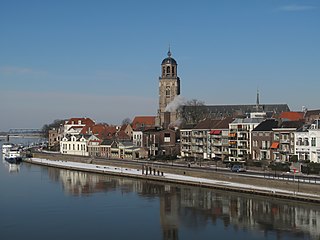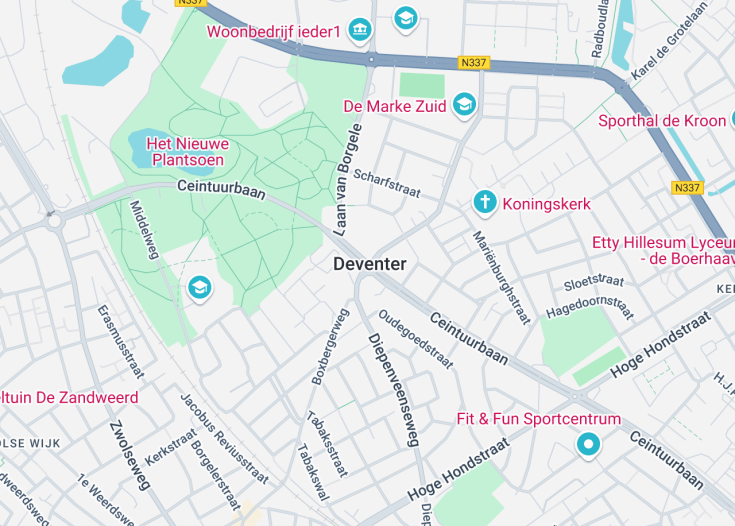Nestled along the banks of the River IJssel, Deventer is one of the Netherlands’ oldest cities, exuding a rich history that dates back to the Roman era. This charming city is renowned for its annual book market, the largest in Europe, and its traditional Deventer Koek, a local honey cake.
With well-preserved medieval buildings, narrow streets, and friendly atmosphere, Deventer offers a picturesque escape into the Netherlands’ historical past while providing all the comforts of modern amenities.
Before you go, check out the events calendar—Deventer hosts various festivals throughout the year that are a treat to experience, especially the Dickens Festival in December.
Plan to visit the Deventer Museum, which offers insights into the rich cultural tapestry of the city and features art from the Middle Ages to modern times.
Top things to do & see in Deventer
Select the following sights and activities to discover best tickets and tours available in Deventer.
Deventer: A Historic Gem in the Heart of the Netherlands
| Country | Netherlands |
| Time in Deventer | GMT+1 |
| Language spoken | Dutch |
| Population | 100,858 (Source: CBS Statline) |
| Currency | Euro (€, EUR) |
| Airports |
|
Deventer, one of the oldest cities in the Netherlands, boasts a rich history dating back over a millennium. This charming city along the IJssel River is known for its medieval architecture, vibrant cultural scene, and annual events like the Deventer Book Market, the largest in Europe. The historic town center is home to beautifully preserved buildings, such as the Lebuïnus Church and the old city hall, making it a picturesque destination for history enthusiasts and tourists alike.
Where is Deventer?
Situated in the eastern part of the Netherlands, Deventer lies on the banks of the river IJssel.
Distances:
| Route | Distance by car | Time by car |
|---|---|---|
| From Amsterdam | 90 miles | 1 hour 30 minutes |
| From Rotterdam | 100 miles | 1 hour 40 minutes |
| From Utrecht | 55 miles | 1 hour |
What is Deventer famous for?
Deventer is renowned for its historical heritage, including the Lebuïnus Church, its traditional Dutch architecture, and the largest book market in Europe, attracting thousands of visitors each year.
History
Pre-Medieval Period (Before 768 AD)
The area now known as Deventer was inhabited by Germanic tribes, primarily the Saxons, long before it became a recognized settlement. Relics from these early inhabitants suggest a community centered around agriculture and trade, facilitated by the IJssel River, which provided both sustenance and a route for exchange.
Early Middle Ages (768-1500 AD)
The official foundation of Deventer dates back to around 768 AD when the English missionary Lebuinus built a wooden church near the IJssel. This marked the beginning of the town’s religious significance. By the 10th century, Deventer had become a flourishing trade city, benefiting from its membership in the Hanseatic League, a powerful commercial and defensive confederation of merchant guilds and market towns in Northwestern and Central Europe.
Renaissance and Reformation (1500-1700 AD)
During the Renaissance, Deventer became a center for humanism and education. The city was impacted by the Reformation, with significant religious upheaval and shifts in power. This period also saw the construction of Deventer’s Waag (Weigh House), in 1528, symbolizing the city’s continued economic relevance through trade.
Industrial Age to World War II (1700-1945)
With the advent of the Industrial Revolution, Deventer diversified its economy with the rise of industries such as manufacturing and textiles. However, the city was not exempt from the turmoil of World War II. It endured significant hardships, including occupations and bombings, which shaped much of its modern landscape and infrastructure.
Post-War Period to Present (1945 to Present)
Post-war reconstruction was pivotal in shaping modern Deventer, with an emphasis on housing and restoring historical buildings. Today, Deventer prides itself on a balanced blend of historical reverence and modernity, hosting numerous cultural events and maintaining a dynamic community life while preserving its rich historical tapestry.
Visit Deventer
What to see and do in Deventer
Deventer, located along the IJssel River, offers a plethora of attractions that captivate visitors. Begin your exploration at the historic Grote of Lebuinuskerk, a stunning Gothic church that dominates the city’s skyline. The Brink, Deventer’s central square, hosts the city’s famous book market and is lined with cafes and historic buildings.
For museum enthusiasts, the Deventer Museum offers insights into the city’s art and cultural history. Nature lovers can enjoy walks along the river or visit the nearby Deventer Bos. Lastly, don’t miss out on the historical Waag building, functioning today as a museum showcasing Deventer’s rich trade history.
- Grote of Lebuinuskerk
- The Brink
- Deventer Museum
- Deventer Bos
- Historical Waag Building
Events in Deventer
Deventer is lively with events throughout the year, notably the Deventer Book Market, held annually in August, which is Europe’s largest outdoor book market. December brings the Dickens Festival, transforming the city into a Victorian-era scene from Charles Dickens’ novels.
Both events draw crowds from across the Netherlands and beyond, infusing the city with a festive, vibrant atmosphere.
Best time to visit Deventer
The best time to visit Deventer is during the summer, particularly from June to August, when the weather is most favorable for exploring the city’s outdoor attractions and participating in special events like the Deventer Book Market. Alternatively, visiting in December offers the unique experience of the Dickens Festival, with the city adorned in a festive atmosphere.
Is Deventer worth visiting?
Deventer is undoubtedly worth visiting for its rich historical tapestry, vibrant cultural scene, and picturesque settings. Its well-preserved medieval center, combined with the lively events and welcoming local community, offers a unique and enriching experience for all types of travelers.
Whether you’re a history enthusiast, a cultural connoisseur, or simply looking for a charming Dutch city to explore, Deventer provides a variety of attractions to satisfy every interest.









